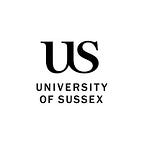“The hardest part was identifying the insects”
Cassandra Uthoff will representing Sussex at the annual Posters in Parliament* exhibition in London on 11 March after her Junior Research Associate project poster on competition between bee species was given first place in the University’s own Undergraduate Research Poster Exhibition.
I’m both nervous and excited about presenting at Posters in Parliament. I understand that there will be students from universities all over the country at the event in Westminster. This is a great opportunity for me and to show parliamentarians and policymakers the work we do here.
I was in the first year of my biology degree when I heard that Professor Francis Ratnieks was looking for someone to help with bumble bee research over the summer. I already had plans to go back to Germany, where I’m from. But in my second year I emailed him and asked if he was doing something like that again. He suggested I apply to become a Junior Research Associate. We came up with a project helping his PhD student, Veronica Wignall, in the Laboratory of Apiculture and Social Insects. She is looking at the foraging behaviour of bees and competition between them.
The project involved monitoring four patches of bramble [wild blackberry shrubs] — at one site near the University and another near Brighton Marina — to see if excluding honey bees, bumble bees or both from bramble flowers (simply by pushing them away with a bamboo cane whenever they came near) affected the volume of nectar available to insects, and the frequency of other bee species visiting the flowers.
We found that when we excluded bumble bees and honey bees, there was a 194% increase in other bee species, as well as more wasps and other insects. There are around 270 bee species in England, but honey bees are really good at extracting nectar, which means they deplete it for other species to build up a honey store for the winter. This is called exploitative competition. We can’t say for certain that honey bees cause a reproductive decline in other bee species, but it looks like that might be the case.
The hardest part was identifying all the other insects. Every fifteen minutes we did a survey of the bee and insect species on the bramble. I’d be leafing through a 400-page book to try to identify them by their colours or their markings. If I couldn’t then I would trap then in a little tube so that we could take them back to the research lab to identify them. I’m pretty good on bees now, and hoverflies.
The research was quite a step up from the lab studies I’ve done as an undergraduate. It involved several days of intensive fieldwork, monitoring the bramble from 9am until 6pm. We then did the data analysis and insect identification in the labs. But Veronica was really great to work with and it was fun.
I’m so glad I did it because I discovered a passion for research, and for understanding more about bees. I was originally interested in human biology, but during my second year we had a course on animal behaviour ecology — also with Francis. We learned about bees and guarding behaviour. I was so interested that for my dissertation I looked at solitary bees and how they rely on ivy for their survival.
I’d like to continue in research, possibly with a PhD at Sussex. I’m really interested in bees now and Sussex does a lot of research in this area. With concerns about crop pollination and food supply, it’s such an important topic these days.
I’ve been visiting the Sussex campus since I was studying for A-levels at Shoreham Academy. In Germany you can do a year abroad after our equivalent of GCSEs, so I came here at the age of 16 and stayed with a host family. I enjoyed it so much that I wanted to stay on to finish the A levels. We had lots of trips to campus. I looked at other universities but I really like Sussex because it’s surrounded by greenery. My home in Germany is in the middle of the country and I appreciate it that I can just walk into Stanmer Park from campus.
*Finance and Business undergraduate Artur Lindmaa, who was the runner-up in the University’s JRA research poster competition, will also be presenting his poster, “Sentiment Indices for Cryptocurrencies”.
Interview by Jacqui Bealing
This profile is part of our This Sussex Life series.
Visit the University of Sussex website
